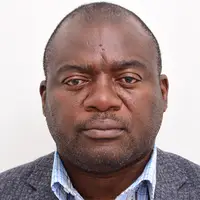Each year, the University of North Carolina’s Water and Health Conference brings together policymakers, practitioners, and researchers from around the globe to review current science and practices and develop new approaches to expand access to water, sanitation, and hygiene (WASH).
In light of this important event, we took the opportunity to sit down (virtually) with two chiefs of party for USAID WASH projects led by RTI International: Paul Orengoh, from Kisumu, Kenya, who leads the USAID Western Kenya Sanitation Project, and George Ndongwe, of Lusaka, Zambia, who leads the USAID Expanding Water and Sanitation Project.
They bring unique knowledge and understanding of the WASH sector and shared their perspectives on the current state of WASH and what the future might hold.
What is the biggest challenge facing the WASH sector—and your project in particular? What is the biggest opportunity?
Paul: “The two main challenges facing the WASH sector in Kenya—like most countries in Africa—are limited political will, which pushes WASH financing to the bottom of the public financing priority list, and ineffective sector coordination, which is compounded by limited human and technical capacity. These challenges often render WASH institutions unfit to perform their intended purpose. Weak institutions lead to weak coordination and fragmented interventions that often prove ineffective.
However, an opportunity lies in devolved units of governance, as outlined in Kenya’s 2010 Constitution. It clarified the roles between national and county governments, with each assigned some level of complementary responsibility for WASH sector development. Each level of government allocates resources to support WASH interventions within their mandate, which helps the sector grow. A clear division of roles and responsibilities also facilitates collaboration with partners interested in supporting WASH sector development at one level or another, while minimizing the bureaucracy previously associated with public sector partnerships.”
George: “The biggest challenge faced by the WASH sector in Zambia is the sheer inadequacy of existing infrastructure to meet current and future demand for WASH services and the poor state of this infrastructure. For example, according to the National Water Supply and Sanitation Council (NWASCO) 2021 National Urban and Peri-Urban Sector Report, though service coverage in urban and peri-urban areas of Zambia has increased to 89.2%, service is intermittent, with most households receiving an average of 17 hours of water services a day. This is largely because most of the infrastructure is old and needs improvement.
Inefficient WASH service provider operations compound these infrastructure limitations. For example, according to the NWASCO report, non-revenue water averaged about 55.8%, which translates into a revenue loss of about 1.1 billion ZMK (approx. $70 million USD) in 2021. Additionally, 8 of 11 commercial water utilities recorded an Infrastructure Leakage Index of more than 16, indicating a possibility of ‘extremely high physical losses.’
Despite these challenges, the WASH sector in Zambia presents an opportunity for expanded use of private sector-led WASH investments that would improve service delivery. Regulatory and legal changes would enable further private sector participation in service delivery in the coming years as well.”
How can the USAID projects you’re implementing elevate and share lessons learned to inform and improve future WASH work?
Paul: “In addition to building a sense of collective responsibility, the USAID Western Kenya Sanitation Project is promoting peer-to-peer learning among and between counties. In doing so, the project is creating a process through which lessons learned are used by the public and private sector to continuously improve service delivery and WASH investment planning.”
George: “The USAID Expanding Water and Sanitation Project is ensuring that lessons learned during project implementation are well documented and shared with key stakeholders in the WASH space—this includes service providers, cooperating partners and the government. Furthermore, the project will take advantage of local and international platforms when sharing these lessons learned and incorporate these lessons into future projects.”
As established experts, what is the one piece of advice you would give to someone entering the WASH sector and WASH profession?
Paul: “Working in the sanitation and menstrual hygiene management (MHM) space has made me more aware of existing capacity and investment gaps. While the western Kenya environment is ready for market-based sanitation and MHM, these gaps cannot be addressed all at once. It will take a concerted effort by national and county governments working with development partners, the private sector, and other stakeholders to address systemic challenges. In doing so, many careers will be developed, many job opportunities will be created, and many households will be pulled out of poverty. I would advise anyone, especially young people, to not be deterred by the challenges currently present in the WASH sector, as its opportunities for investment and career development will only continue to grow in the coming years.”
George: “Though the Zambian government has implemented various reforms aimed at ensuring improved access and quality of WASH service delivery, several issues that impact long-term sustainability remain unresolved. It is critical that young people looking to enter the sector are well prepared and trained in areas such as investment in infrastructure (including renovation and expansion) and cost reflective tariffs for service providers—two of many multifaced issues facing the WASH sector in Zambia—if they are to be successful in improving WASH service delivery in the long term.”
Learn more about RTI’s WASH work.

